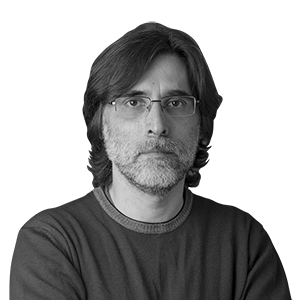"To have a good life, we must be able to endure the gaze."
The philosopher David Casassas reflects on freedom and its material and symbolic conditions at the Pedralbes Monastery.


BarcelonaDidactic, stimulating, countercultural, and radically sensible. This is how sociologist David Casassas's thinking flowed in the fourth session of the series. Dialogues on Ethics and Moral Philosophy held at the Pedralbes Monastery, co-organized by Barcelona City Council and the newspaper ARA and curated by philosopher and essayist Daniel Gamper. The (im)possibility of the good life was the title of the talk. Spurred on by questions from Gamper, Antoni Bassas, and the audience, Casassas deployed his accumulated knowledge of Aristotle, Adam Smith, Marx, Don Quixote, and democratic republicanism to connect concepts and examples, especially those related to freedom, such as those he develops in the book. Unconditional Freedom: Basic Income in the Democratic Revolution (Tigre de Papel, 2022).
"We need to be able to hold each other's gaze in order to have a good life, and not bow our heads for reasons of material or symbolic dependence," he has said, almost as an irrefutable synthesis to explain what true freedom is. Because one is free when one has "material or symbolic resources," when one's decisions do not depend on "the people who call the shots" or on a gun. This idea of democratic republicanism has confronted him with theories that proclaim that "freedom means being equal before the law," but which do not concern themselves with material conditions, access to which, by the way, must be "unconditional" and must allow one to carry out "activities that each one values." per se, that are not purely instrumental."
David Casassas, who works at the Faculty of Economics and Business at the UB, also defends "work as a meaningful and consensual human activity" and combats the neoliberal turn that "erodes the foundations of a small, great security on which freedom must rest." This is after citing analysis by Adam Smith and Italian and Spanish constitutional texts, and before linking the Hospital Clínic (universal public healthcare) with Marxist social justice and the "fair tax systems" of liberal democracies "achieved through democratic republicanism."
